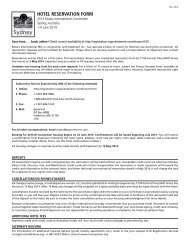DISCURSOS - Rotary International
DISCURSOS - Rotary International
DISCURSOS - Rotary International
Create successful ePaper yourself
Turn your PDF publications into a flip-book with our unique Google optimized e-Paper software.
You may ask what differences the <strong>Rotary</strong> Peace Fellowship program is making and the potential it<br />
has for the future.<br />
It is not controversial today that education is a key tool for accelerating development, and the correlation<br />
between justice, peace, and development has been widely accepted. The sheer scale of the<br />
devastating effects that violence and large-scale conflict have on development was recently emphasized<br />
by the World Bank in its landmark 2011 World Development Report. According to this report, a<br />
civil war costs, on average, as much as three decades of GDP growth in a medium-size developing<br />
economy. Two decades are usually needed to restore trade levels after major outbreaks of violence.<br />
Conflict has a devastating impact on the world. It is estimated that 1 billion people, including about<br />
340 million of the world’s extreme poor, live in fragile states, in extreme poverty, and without reliable<br />
and stable basic governance and security.<br />
Without proper and timely handling, conflict can easily destabilize an entire region. Its global impacts<br />
are quickly seen, thanks to information technology and globalization. There is an ongoing need<br />
for intervention, mitigation, transformation, and resolution plans that are well thought-out and coordinated.<br />
I believe that the resolve of Rotarians to establish research and education centers at leading<br />
academic institutions across the globe is truly an innovative response to the global need.<br />
These centers are unique in many ways: They are different in their academic culture, method of<br />
instruction, geographic location, and diverse excellence. Despite their differences, all serve one purpose:<br />
serving humanity to cherish peace through knowledge. In other words, all centers, having admitted<br />
interested and competent applicants from all over the world through a rigorous competitive<br />
process, train and equip them with tools for conflict prevention, management, transformation, and<br />
resolution. More so, these graduates of the <strong>Rotary</strong> Peace Fellowship are functioning and collaborating<br />
with one another, either in well-organized or informal ways, through their global networks.<br />
Peace fellows come to the centers with rich experience in the field and an extensive knowledge<br />
base to be shared with the scholars and students of the university community. Their exposure to<br />
global culture and the experiences of their colleagues is supplemented by lectures, readings, conflict<br />
analysis tools, deep and complex theoretical frameworks, campuswide and off-campus seminars,<br />
and various other RI-led global and regional functions. I cannot think of any other program in<br />
this field that parallels the <strong>Rotary</strong> Peace Centers experience.<br />
By drawing on my personal experience, I can note here some of the valuable contributions of the<br />
<strong>Rotary</strong> Peace Centers:<br />
1. My <strong>Rotary</strong> Peace Fellowship at Berkeley exposed me to an unforgettable global culture<br />
of peace, tolerance, mutualism, and respect for diversity.<br />
2. This fellowship helped me become an independent thinker who can develop innovative<br />
solutions to conflict.<br />
3. The fellowship gave me an opportunity to reach out to amazing global networks of peace.<br />
4. My association with a leading research university and <strong>Rotary</strong> Peace Center earned<br />
me immediate recognition as a scholar, practitioner, and executive coach in the field<br />
of conflict resolution. To mention just one example, I was nominated to join the World<br />
Economic Forum’s Global Agenda Council on the Rule of Law thanks to recognition of the<br />
<strong>Rotary</strong> center at Berkeley.<br />
5. <strong>Rotary</strong> Peace Centers established for the world’s benefit one common roster of peace<br />
fellows who are linked in spirit and action to the ideals of <strong>Rotary</strong> <strong>International</strong>. Scholars<br />
and graduates of these centers are highly respected because they are known to have<br />
been trained at prestigious universities.<br />
6. Last but not least, the <strong>Rotary</strong> Peace Fellowship offers those of us from unrepresented<br />
parts of the world, such as Africa, opportunities that we would never have otherwise.<br />
<strong>International</strong> Assembly Speeches 2013 31



![La présidence du club [222-FR] - Rotary International](https://img.yumpu.com/25855726/1/190x245/la-presidence-du-club-222-fr-rotary-international.jpg?quality=85)

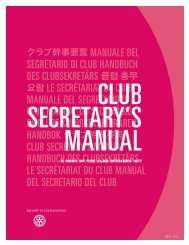
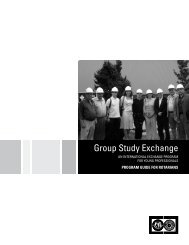
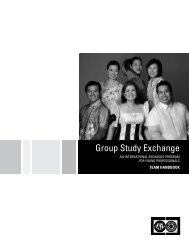
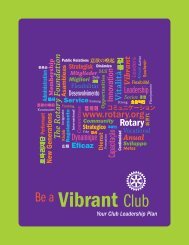
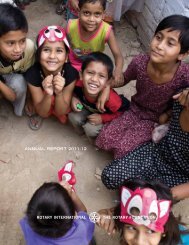
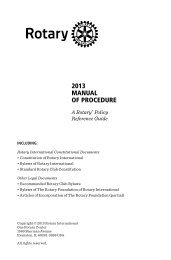

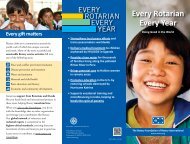
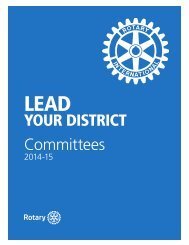
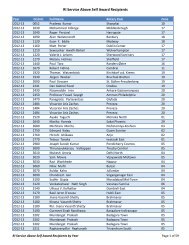
![La conférence de district [800-FR] - Rotary International](https://img.yumpu.com/25855636/1/190x245/la-conference-de-district-800-fr-rotary-international.jpg?quality=85)
